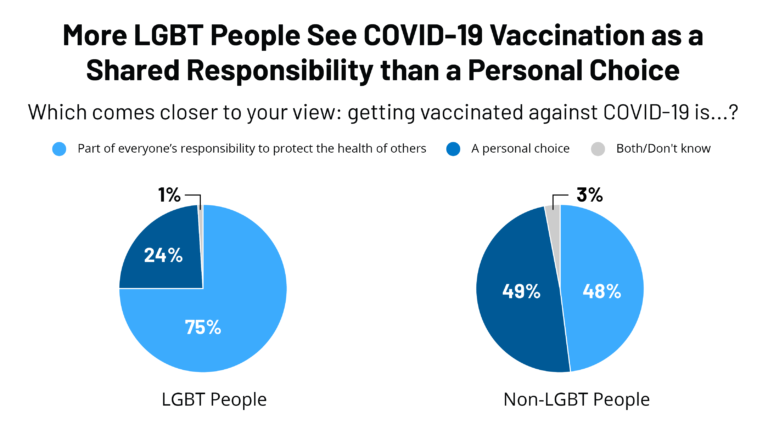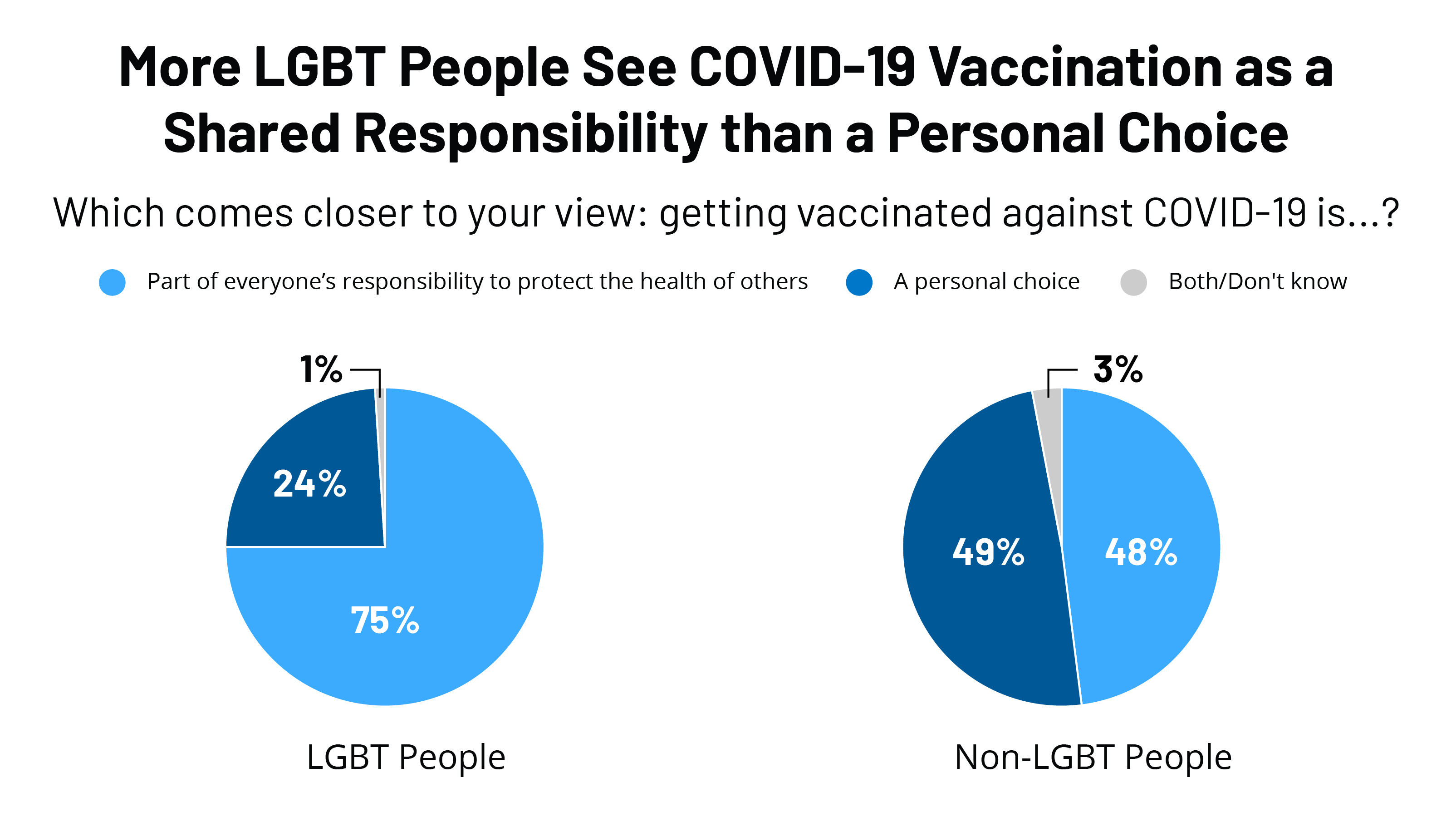

Key Findings
There has been little data on how the coronavirus pandemic has impacted the lives of lesbian, gay, bisexual, and transgender individuals (LGBT) in the U.S. Drawing on previous research indicating that LGBT individuals are at greater risk of both COVID-19 health and economic outcomes, this analysis examines the reported experiences from self-identified LGBT individuals from two months of the KFF COVID-19 Vaccine Monitor and finds that LGBT people have experienced the COVID-19 pandemic differently than non-LGBT people, including being harder hit in some areas:
- Economic: A larger share of LGBT adults compared to non-LGBT adults report that they or someone in their household has experienced COVID-era job loss (56% v. 44%).
- Mental health: Three-fourths of LGBT people (74%) say worry and stress from the pandemic has had a negative impact on their mental health, compared to 49% of those who are not LGBT, and are more likely to say that negative impact has been major (49% v 23%).
- Views: One-third (34%) of LGBT adults say the news has generally underestimated the seriousness of the pandemic (compared to 23% of non-LGBT adults). Three-fourths of LGBT adults (74%) are either “very worried” or “somewhat worried” that they or someone in their family will get sick from the coronavirus, similar to responses from, non-LGBT adults (67%). A large share of LGBT adults report being willing to take CDC recommend steps to avoid acquisition/transmission of the virus.
- Vaccine: While LGBT people report wanting to get vaccinated at a similar pace as non-LGBT people, a greater share of LGBT adults see doing so as part of everyone’s responsibility to protect the health of others (75% v. 48%), while greater shares of non-LGBT people see vaccination as a personal choice (49% v 24%).
Why Examine COVID-19 Views and Experiences of LGBT Populations?
Limited early data available on how LGBT people have experienced the COVID-19 pandemic in the United States (U.S.) has suggested that this group may be disproportionately impacted. The reasons are far-reaching and may include: LGBT individuals being at greater risk of worse COVID-19 outcomes due to higher rates of comorbidities; working in highly affected industries such as health care and restaurants/food services; living on average on lower incomes than non-LGBT people; experiencing stigma and discrimination related to sexual orientation/gender identity, including in accessing health care; and, for transgender individuals, being less likely to have health coverage. As the pandemic continues to take a toll nationwide, our analysis from the KFF COVID-19 Vaccine Monitor explores self-identified LGBT people’s COVID-19 experiences and offers comparisons to the non-LGBT population. We find that LGBT adults have experienced the pandemic differently than non-LGBT people in some key domains including with respect to their risk of COVID-19, mental health, employment loss, vaccine attitudes, and willingness to engage in risk-reduction behavior such as social distancing.
The analysis is based on findings from the December and January KFF COVID-19 Vaccine Monitor and building on previous research conducted early on, offers a new look at experiences nearly a year into the pandemic.
COVID-19 Economic and Health Impacts
Echoing previous research conducted earlier on in the pandemic, we find that LGBT adults and their household members report facing COVID-era job loss at higher rates than non-LGBT adults. Since February 2020, 56% of LGBT people report that they or another adult in their household have lost a job, been placed on furlough, or had their income or hours reduced because of the coronavirus outbreak, compared to 44% of non-LGBT people. Separate research has found that LGBT people are more likely to work in industries hard hit by the pandemic, such as restaurants or food services, than their non-LGBT peers.
In addition to personal or familial experience with job loss, the COVID-19 pandemic has been hard hitting for LGBT people in terms of mental health. Prior to the pandemic, LGBT people experienced certain mental health conditions at higher rates than non-LGBT people. In this analysis, we find three-fourths of LGBT people (74%) say worry and stress from the pandemic has had a negative impact on their mental health, compared to 49% of non-LGBT people. In addition, LGBT people more than twice as likely to say this negative impact has been major (49% compared to 23%).
Views Of the COVID-19 Pandemic
LGBT people have a different perspective on some aspects of the pandemic compared to non-LGBT people, including regarding the media’s portrayal and their own level of concern. They also have different views on COVID-19 risk mitigation efforts.
One-third (34%) of LGBT adults say the news has generally underestimated the seriousness of the pandemic (compared to 23% of non-LGBT adults). A much smaller share of LGBT people say the seriousness of coronavirus is exaggerated in the news compared to non-LGBT people (15% vs 34%). Previous KFF COVID-19 Vaccine Monitor analysis finds that these views are largely driven by partisanship, with larger shares Republicans saying the seriousness of the pandemic has been “generally exaggerated” compared to Democrats and independents.
Three-fourths of LGBT adults (74%) say they are either “very worried” or “somewhat worried” that they or someone in their family will get sick from the coronavirus. While this share is not statistically different than those of non-LGBT adults (67%), it demonstrate the high level of concern among LGBT individuals which may be correlated to taking more precautions to protect themselves and family members.
In addition to worry surrounding the virus, large shares of LGBT people report being willing to take CDC recommend steps to avoid acquisition/transmission of COVID-19. Larger shares of LGBT people say they could follow social distancing guidelines for more than six months or until there is a vaccine widely available than non-LGBT people (85% v 69%). Conversely, larger shares of non-LGBT people say they could follow social distancing guidelines for only up to six months compared to LGBT people (28% v. 14%). Additionally and similarly to non-LGBT people, vast majorities of LGBT people also say they wear a mask every time or most of the time when they leave the house (97%) and accurately believe masks limit the spread of coronavirus (90%).
While LGBT people report wanting to get vaccinated at the same rate as non-LGBT people, LGBT people hold different views on whether getting vaccinated is public health imperative or individual choice. LGBT people report wanting to get the vaccine as soon as possible (40%) or take a wait and see approach (39%) at similar rates as non-LGBT people (36% and 36%, respectively). One in ten LGBT people (10%) say they definitely do not plan to get the vaccine, statistically similar to 15% of non-LGBT people.
In Their Own Words.
We asked LGBT people to explain in their own words, “What is the biggest concern you have about getting a COVID-19 vaccine?” Select responses follow:
“My biggest concern is actually getting the vaccine on a timely manner and then the second dose. With so much chaos in this country” – Male, white, transgender, California
“Honestly, I just think that the vaccine was “rushed”, but I’ll probably consider it later on the future for any side affects of any kind.” – Female, black, bisexual, Florida
“Know what really it contains? Is it trustworthy?” – Female, Hispanic, bisexual, Florida
However, a larger share of LGBT people believe getting vaccinated is part of everyone’s responsibility to protect the health of others (75% v. 48%) and a smaller share sees it as a personal choice (24% v. 49%) compared to non-LGBT people.
Implications
Compared to non-LGBT adults, larger shares of LGBT people report experiencing COVID-era job loss, say the pandemic has had a negative impact on their mental health, and report being worried about getting COVID-19. As such it may not be surprising that smaller shares believe the media has overstated the seriousness of the pandemic and with more saying it has been understated. The greater levels of concern and negative experiences with the pandemic in certain domains may also play a role in LGBT people’s willingness to take recommend steps to avoid acquisition/transmission of the virus. Finally, a larger share of LGBT people view COVID-19 vaccination as a collective responsibility than as an individual choice, potentially reflecting the community’s experience with HIV, another infectious disease that requires community level buy-in of public health strategies to curb. While sexual orientation and gender identity may drive some of the differences we find between LGBT and non-LGBT adults, it is also important to note the two populations differ markedly in other key areas. Compared to non-LGBT adults, larger shares of LGBT adults are younger, live on lower incomes, and identify as Democrats, factors that may also contribute to the difference observed. Targeted vaccine outreach to LGBT people could be helpful in reaching a group that has high rates of comorbidities that place them at elevated risk for COVID-19 but has traditionally faced barriers to accessing medical care.
Methods
The KFF COVID-19 Vaccine Monitor is an ongoing research project tracking the public’s attitudes and experiences with COVID-19 vaccinations. Using a combination of surveys and qualitative research, this project tracks the dynamic nature of public opinion as vaccine development and distribution unfold, including vaccine confidence and acceptance, information needs, trusted messengers and messages, as well as the public’s experiences with vaccination.
Designed and analyzed by researchers at KFF, this analysis is based on interviews conducted in December and January among a nationally representative random digit dial telephone sample of 174 adults who identified as lesbian, gay, bisexual, or transgender. The margin of sampling error is plus or minus 9 percentage points for the full LGBT sample and 2 percentage points for the non-LGBT sample. For results based on subgroups, the margin of sampling error may be higher. Detailed methodology can be found in the toplines for the December and January KFF COVID-19 Vaccine Monitor. Methods for the qualitative “in their own words” findings can be found at KFF COVID-19 Vaccine Monitor: In their Own Words.
This work was supported in part by the Elton John AIDS Foundation. We value our funders. KFF maintains full editorial control over all of its policy analysis, polling, and journalism activities. KFF paid for all costs associated with the survey.